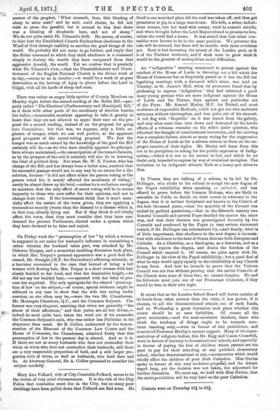On Friday week the " presumption of law " by
which a woman supposed to act under her husband's influence in committing a -crime wherein the husband takes part, was attacked by Mr. Osborne Morgan, and a somewhat rambling discussion took place, in which Mrs. Torpey's personal appearance was a good deal die-
• cussed, Mr. Straight (M.P. for Shrewsbury) affirming solemnly, as -a barrister concerned in the case, that instead of being a tall woman with flowing hair, Mrs. Torpey is a short woman with hair -closely braided to her head, and that her diminutive height,—he did not say her braided hair,—co-operated with her baby to pro- -cure her acquittal. The only apologists for the absurd presump- tion of law' on the subject,—of course, special evidence might be adduced in any case to show that the wife was acting under .coercion, as she often may be,—were the two Mr. Chambersea, Mr. Montague Chambers, Q.C., and the Common Serjeant. The former was very eloquent, asserting that wives are generally "the slaves of their affections," and that juries are all but divine,— 111-- indeed he must quite have taken the wind out of his namesake the Common-Serjeant's sails, who was rather less Philistine in his -eloquence than usual. Sir R. Collier, undeterred by the demon- stration of the Dioscuri of the Common Law Courts and the House of Commons, the Chamberses, admitted freely that this presumption of law in the present day is absurd. And so it is. If there are not as many husbands who dare not contradict their wives as wives who dare not contradict their husbands, still there are a very respectable proportion of both, and a still larger pro- portion both of wives, as well as husbands, who both dare and do. As Attorney-General, Sir A. Collier promised to consider the subject carefully.


































 Previous page
Previous page